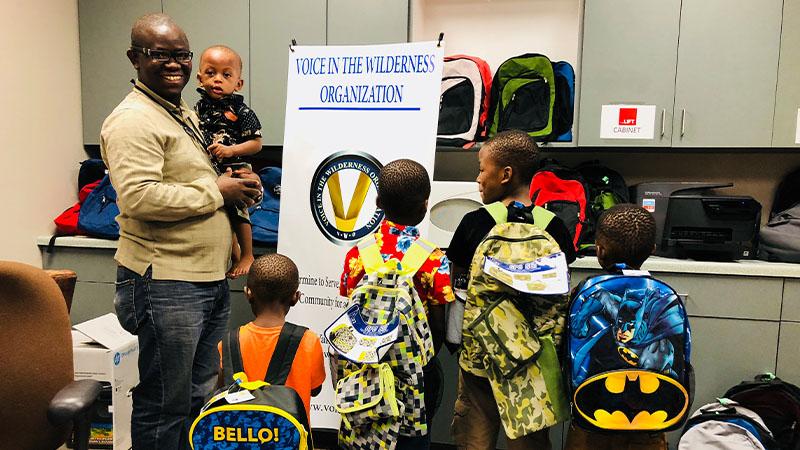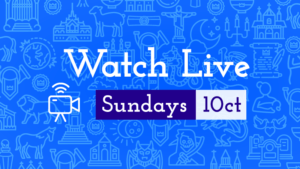Voice in the Wilderness Organization, is an on-site Woodland Hills partner ministry that provides support for Congolese both in Minnesota and in the Democratic Republic of Congo (DRC)—spanning a distance of 8,000 miles! Here, co-founder Kilo Kisongo shares how God is working through VWO.
What does VWO do in Minnesota?
We help Congolese refugees who have been forced to leave their homes due to ongoing conflict and violence are as they replant their lives in Minnesota. Our ministry offers services like language interpretation, housing and job searching, drivers ed, benefit and healthcare applications, ESL classes and youth programs.
We also helped start a Congolese-language church after we noticed a need for one, as many newcomers do not speak English. Today, Golgotha Church, which gathers at Woodland Hills, is meeting the spiritual needs of some Congolese Christians living in the Twin Cities.
What does VWO do in the Democratic Republic of Congo?
In the DRC we focus on education. We built a school providing education to more than 300 students from pre-K through high school. We are teaching kids technology and have provided employment to more than 30 people in the area. Because the need is greater than we initially thought, we are currently raising funds to build a second level on the building.
VWO is “by refugees for refugees.” What is this work like for you?
Our experience as Congolese refugees in assisting newcomers has been very rewarding to us because we have provided so much help to refugees who were in very difficult situations. The work we do is hard because we do it with next to no resources, but we are thankful to Almighty God for walking with us even when things seem impossible.
How has God used you to impact the lives of Congolese families?
There are so many stories that we could tell, but I’ll limit it to two!
One single mother came here with five children, and she went through a lot of depression. At one point, she even wanted to take her own life. She was struggling with her children, and did not know any English. In addition, she had chronic back pain and because she could not work to pay rent, the family had to move multiple times. We started working with this family very closely. We gave them emotional and material support, such as clothing, and started educating the family about life in America and about the importance of school. We also connected the family with a group of people who helped with rent. Because of this support, this lady now speaks English, three of her children received running scholarships, one has received a bachelor’s degree in business, one has begun her MBA in healthcare administration management, and her youngest child started college this year.
Another single mother, pregnant and with three children, was initially resettled in Houston, Texas. Two weeks after her arrival, we received a call that the family was staying in a hotel because the resettlement agency there was unable to find housing. VWO contacted the caseworker in Texas to ask why the family was not receiving the services and attention they needed as newcomers. The caseworker said that she was very busy, and had not really had time to go visit this family in the hotel. Although we did not know how we would be able to host them, VWO decided to help. My co-founder, Djuma, and I used our own money to buy bus tickets to Minnesota. While the family was on their way, we started working out where they would stay. A Congolese woman who had been here for 14 years volunteered to host the family and they stayed with her for three months. During that time, we made sure the newly arrived mother and children were able to receive food stamps and other benefits, and we helped her find a job and a two-bedroom apartment. She had her baby, and is now independent with all her children enrolled in school.
How do you help new refugees both adapt to the U.S. and preserve their culture?
We help our people understand the lifestyle and culture in the United States and some of the norms and practices they should expect here that are different from our own. Keeping and celebrating Congolese culture is important to us. We make sure people recognize that the land we are in now is different and far away from home, and that there is a possibility that many of our new generation will never return home again. In our youth programs we teach the younger generation about our homeland and our culture and its importance. We use our community gatherings to remind one another about how people should live in a community and what our ancestors used to do back in the old days.
What are some of your favorite things about your home culture?
One of my favorite things is the way people are taught to be welcoming, sharing, polite and respectful. Also, I enjoy the cultural wedding ceremonies, the music and the food.
How can we join in prayer for VWO?
Some of the prayers our ministry needs are for volunteers to help in areas such as ESL, grant writing, driving instruction and tutoring our children. For the work in the DRC, we are hoping God will help us raise the $65,000 we need to finish the school. We are also hoping God will open doors for a mission trip in the DRC. We would love people to come on a mission trip with us: teachers, preachers, doctors, nurses and anyone who would like to serve Congolese people in the DRC.
Thank you Kilo and Djuma. Truly you are following the words of Jesus, “I was a stranger and you welcomed me.”
If you are interested in learning more about Voice in the Wilderness Organization, check out their website here.








Hello,
I watch your sermons frequently from the Seattle area and am the chair of Congo Peace, a local NGO working in South Kivu founded by Alexis Ruhumuriza. I’d love to get in contact with you and put you in contact with our partner Congolese NGO New Hope Reconciliation Center.
Mark J. Phelps
Chair
Congopeace.org
425-765-8360
Hi Mark,
Thanks for the message! You can contact Voice in the Wilderness Organization directly: Kilo at wisekilo@gmail.com or Djuma at kassongo4@gmail.com.
— Emily from Communications Team